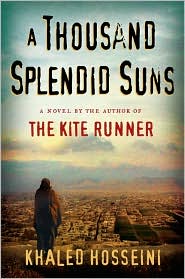Rich (2/5): A Thousand Splendid Suns by Khaled Hosseini
 I'm probably the only person in the world who hasn't read the Kite Runner, yet has read Hosseini's second book. I might be able to feign laziness, since I received this as a gift, but I also have the Kite Runner sitting on my shelves (likely picked up at a local book fair). It'll likely sit there, waiting for the opportune moment when I revisit Hosseini. But, with this newfound momentum, I'm first likely to tackle a few other stalwarts on my shelf of orphaned books.
I'm probably the only person in the world who hasn't read the Kite Runner, yet has read Hosseini's second book. I might be able to feign laziness, since I received this as a gift, but I also have the Kite Runner sitting on my shelves (likely picked up at a local book fair). It'll likely sit there, waiting for the opportune moment when I revisit Hosseini. But, with this newfound momentum, I'm first likely to tackle a few other stalwarts on my shelf of orphaned books.A Thousand Splendid Suns is really two braids of the same rope, intertwining the modern history of war-torn Afghanistan and the lives of two of its women, Mariam and Laila. Those two women stay behind in their houses, while the men toss rockets at one another. Under one regime, the women are held as equals, studying next to their male brethren. Then, the bombs go one way, the ruling regime changes, and women are not even allowed to step outside without being accompanied by a male relative. The bigotry creeps inside the walls, where Mariam and Laila are in even greater danger.
At times, these two are less people than puppets advancing the last three decades of Afghanistan history, unraveling Hosseini's two coupled stories. This allows the reader to slump into broadcast news detachment and instinctively reach for the remote control. Maybe the Kite Runner was more engaging in balancing the characters and historical setting, but Suns is awfully ambitious in covering Soviet, warlord, Taliban, and post-9/11 rule in one single story with the same characters.

